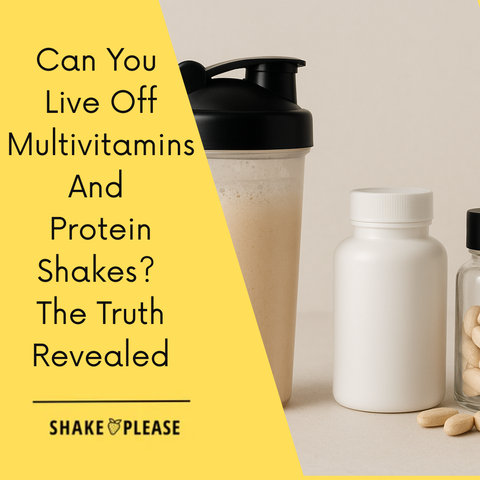
Introduction to Nutrition
Nutrition consists of six essential components: carbohydrates, proteins, fats, vitamins, minerals, and water, all of which are vital for maintaining a healthy, balanced diet, addressing individual nutritional needs. Understanding these basics is crucial when considering the role of whey protein, protein shakes, multivitamins, and nutritional supplements in your nutrition. While these supplements offer convenient ways to support your diet, especially during busy times, they cannot fully replace the variety and complexity of whole foods. Whole foods provide essential amino acids, healthy fats, and a broad spectrum of nutrients that supplements alone may not cover. Relying solely on protein shakes and multivitamins raises important questions about whether your diet remains balanced and if you might risk nutrient deficiencies.
Understanding Supplements
Multivitamins deliver essential vitamins and minerals but don’t provide fiber or phytochemicals key components found in whole foods that support digestion and immune health. Protein shakes offer a convenient source of amino acids, helping to boost protein intake for muscle recovery and growth. These meal replacement shakes and supplements are designed to complement your diet by providing nutrients like protein, including various protein sources vitamins, minerals, and zinc that support metabolism and overall well-being. While nutritional supplements can help fill nutritional gaps, especially for those with dietary restrictions or medical needs, including athletes they should never replace a diverse, balanced diet rich in whole foods.
The Science of Protein
Protein shakes provide amino acids, the essential building blocks that support muscle growth, repair, and vital bodily functions, including immune system health. Our bodies require 20 amino acids, 9 of which are essential amino acids and must be obtained through diet or supplements like protein shakes, underscoring the importance of consuming adequate protein from diverse sources. Protein powders, such as whey protein, vary in quality; some offer basic amino acid profiles, while others include enhanced nutrition with essential fatty acids and vitamins. By supplying these crucial amino acids, protein shakes support overall health and optimal muscle function.
Guide to the Different Types of Protein Powder: Which One is Right for You?
Evaluating a Balanced Diet
A balanced diet consists of nutrient-dense foods such as lean meats, whole grains, fruits, vegetables, healthy fats, eggs and nutritional protein sources, all of which provide essential nutrients and dietary fiber. Whole foods deliver vitamins, minerals, and other key compounds in their natural forms, supporting overall health and well-being. Emphasizing variety in your meals helps ensure optimal nutrition, reducing the risk of deficiencies and related health issues. Relying solely on supplements can leave gaps, missing vital nutrients like iron and phytochemicals found abundantly in leafy greens and other whole foods.
Whole Foods and Nutrition
Whole foods offer complex nutrient interactions that supplements can’t fully replicate, including dietary fiber, antioxidants, and phytochemicals. Fruits, vegetables, whole grains, lean proteins, and healthy fats naturally provide essential nutrients that support immune function and overall health, offering crucial immune system support. Foods rich in vitamin C, along with nutrients that benefit the skin, also deliver fiber and antioxidants, helping reduce the risk of chronic diseases. A diet abundant in colorful fruits, vegetables, whole grains, lean proteins, and healthy fats, along with other vital nutrients, is ideal for maintaining optimal health and sustained energy.
Protein Shakes as Meal Replacements
Protein shakes can be a convenient option for quick snacks or meal replacements, especially for busy lifestyles, offering a good source of protein and essential nutrients. While replacing two meals with protein shakes may provide sustained energy and support muscle and body function, they may lack dietary fiber and some vital nutrients, as well as additional nutrients found in whole foods. It’s important to choose protein shakes made with natural ingredients and minimal additives to avoid excess sugars and maintain a balanced diet for good health. Remember, to get enough protein shakes should complement a well-rounded diet, not replace it, to ensure you get all the essential nutrients your body needs.
For convenient, nutritious options, consider these Shake Please protein shakes:
These blends combine natural ingredients and balanced nutrition to support your active lifestyle as a meal replacement.
Short-Term Experiments
Short-term experiments where individuals live solely on protein powders and supplements for seven days have shown notable weight loss but also diminished energy levels and impaired muscle performance, raising concerns about high levels of reliance on such diets . Such restrictive diets often lead to gastrointestinal discomfort, reduced physical capacity, and nutrient deficiencies for athletes , underscoring the vital role of whole foods in a balanced diet. The body thrives on solid foods for optimal nutrition and sustained energy, highlighting the limitations of relying exclusively on supplements. These experiments reveal that while protein shakes and supplements can support nutrition, they cannot fully replace the benefits of a varied, whole-food diet.
Medical Guidance and Safety
Medical experts strongly advise against relying solely on multivitamins and protein shakes for nutrition, emphasizing the importance of a varied diet rich in whole foods to ensure comprehensive nutrient intake. While supplements can be beneficial in specific situations, such as for those who may have limited access to dairy products or other food sources, including eating vegetables they are not intended as long-term nutrition solutions and should be used under the guidance of healthcare professionals. Understanding supplement labels and consulting with health experts helps prevent unnecessary expenses and reduces the risk of overdosing or adverse effects. Registered dietitians can offer personalized advice on protein needs, meal planning, and supplement use to support your overall health and well-being safely and effectively.
The Best Fruit for Chocolate Protein Shake: Top Additions You'll Love
Nutrition Planning and Monitoring
Effective nutrition requires thoughtful planning and ongoing monitoring tailored to your unique needs. By considering your dietary restrictions, health goals, and lifestyle, including eating vegetables you can create a personalized plan that supports your well-being. Regular tracking and professional guidance ensure you stay on course for optimal health. Here are key aspects to focus on:
-
Nutrition planning takes into account individual needs, dietary restrictions, and health goals to create a personalized diet.
-
Monitoring protein intake, meal frequency, and overall nutrition is essential to maintain balance and avoid deficiencies.
-
Regular health check-ups and consultations with registered dietitians help adjust nutrition plans for optimal health and performance.
-
Keeping a food diary or using nutrition tracking apps supports awareness of dietary habits and informed decisions about supplements and whole foods..
Conclusion and Final Thoughts
While protein shakes and multivitamins can be helpful supplements, they cannot replace a well-balanced diet rich in whole foods for optimal nutrition and health. A varied diet that includes lean meats, whole grains, fruits, vegetables, and healthy fats provides essential nutrients, dietary fiber, and supports immune function. Moderation is crucial when using supplements that provide only protein o ensure enough protein intake, and their use should be guided by healthcare professionals to avoid adverse effects and ensure safe, effective nutrition planning. By prioritizing whole foods and using supplements wisely, individuals can support their overall health, energy, and well-being, achieving a balanced and nutritious diet.





